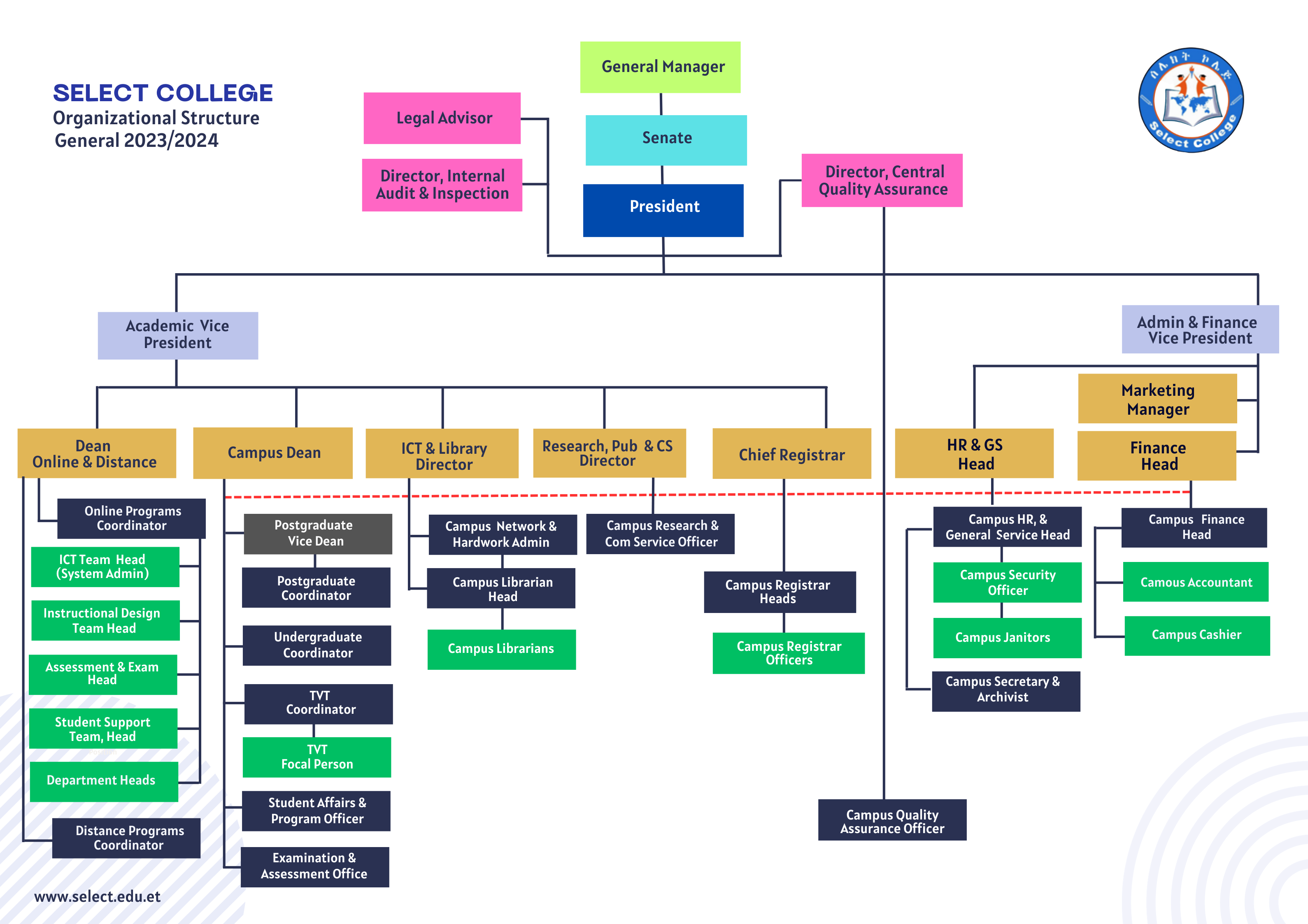Meet the Quality Assurance Director

Haile, Quality Assurance Director
haile@selectmail.edu.etQUALITY ASSURANCE OFFICE
Welcome to the Select College’s Quality Assurance Office! As the Central Quality Assurance Director, I am responsible for ensuring that our institution maintains the highest standards of academic excellence and educational quality.
Working closely with the Postgraduate Coordinator, Undergraduate and TVET Coordinators, Program Officer, and Exam Officers, our team is dedicated to upholding the integrity of our academic programs and ensuring a positive learning experience for all students.
In collaboration with faculty and staff, we develop and implement policies and procedures that promote continuous improvement in teaching, learning, and assessment. We conduct regular evaluations and audits to monitor the effectiveness of our programs, ensuring they align with industry standards and meet the evolving needs of our students.
Our office plays a vital role in fostering a culture of quality and innovation across the college. We provide guidance and support to faculty members in curriculum development, instructional design, and assessment strategies. We also facilitate professional development opportunities to enhance teaching methodologies and promote student engagement.
Additionally, we work closely with the Exam Officers to ensure the smooth administration of examinations, maintaining the integrity and fairness of the assessment process. We strive to create an environment where students can demonstrate their knowledge and skills accurately and fairly.
At Select College, we are committed to providing a transformative educational experience that prepares our students for successful careers and lifelong learning. The Quality Assurance Office is dedicated to upholding these standards and continuously improving the quality of education we offer.
If you have any questions or concerns regarding academic quality, assessment practices, or program development, please feel free to reach out to our office. We are here to support you on your educational journey.
Director
MEGENAGNA CAMPUS ORGANOGRAM

FREQUENTLY ASAKED QUESTIONS
Registration to the program will be done online via the College’s official website. https://Select.edu.et Alternatively students may visit our office in-person and get resisted. Students’ registration to a program involves completing the online application Form and making payment. If there is any problem regarding payment, the applicant should contact the finance office at finance@select.edu.et to get support.
- The requirements to join Select College undergraduate program is basically similar in all departments.
- It may differ from year to year; nevertheless it is always according to the guidelines set by the FDRE Ministry of Higher Education.
- Those from the preparatory program should fulfill the minimum requirement of the Ministry of Education in their national exams and /or;
- Those who prefer to peruse their Bachelor degree studies after they complete a diploma or TVET programin relevant fields of studies from recognized higher educational institutions can apply for the related department.
- The program takes four years to complete.
- You have to successfully complete a minimum of 120 credit hours to graduate.
- You need to have cumulative GPA not less than 2.00 and remove the “F” grade scored in any of the courses.
- You Should meet the minimum requirement set for the major course which is you have to get a “C” mark.
- It is recommended if a student could take approximately 7.5 credit hours every term to complete his study in four years.
- You can take more than or less than the recommended number of credit limits per term if you get approval from your course counselor.
- If you take less than 7.5 credit hours every term, you will need more than four years to complete your undergraduate study.
- The average annual total credit hour you may be permitted would not be grater than 36 credit hour.
- Each module will be represented with Four Block letters acronym for the course. Followed by hyphen and terminated with four digit numbers as in ENLA-M1001
- Each Course will be represented by Four Block letters acronym for the course. Followed by with four digit numbers as in ENLA1001 (There should be no space between the characters in the case of course code)
- The first four digit is a convenient acronym of the course full name
- The –M in the module name represents the word Module and differentiates module codes with course codes (It is applied only to module codes; but not course codes)
- The Last four numerical digits represents the following:
- The first numerical digit represents the class year in which the courses may be taken. Thus 1 represents first year; 2 represents 2nd year… (1-4 undergraduate and 5-9 graduate courses)
- The 2nd numerical digit represents whether the course has one prerequisite, more than one prerequisite or has no prerequisites. Thus 0 represents no prerequisite; 1 represents one prerequisite and 2 stand for courses with more than one prerequisites (Ranges between 0-2)
- The last two numerical digits stands for the course numbers as indicated in the college’s central course catalogue. Each course in a college should have a unique number between 01 and 99 (Ranges between 01-99)
- A program clustered into nine modules each with three to five courses;
- A program composite of 40% descriptive, theoretical and positivist, and 60% normative, knowledge and capacity building courses;
- A program composite of 50% of endogenous sources and realities and 50% exogenous sources and realities of specialized knowledge all gravitating to the main subject – matter civics and ethics;
- A program composite of systematic comparison and contrast between theory and practice with at least 15% field work and practical observations;
- The entire program to be guided by Criterion-referenced evaluation approach, with continuous assessment as an integral part of the teaching learning process
- A program systematically periodized in to 4 phases. These phases are the following:
- Knowledge broadening Phase (familiarizing with academic civic and ethics)
- Knowledge–Building (Describing) Phase;
- Enquiry Provoking Phase; and
- Analysis conducting and criticizing Phase.
- A program composite of self confidence – building, self – expression qualities, dialogue provoking and consensus building techniques facilitated by group discussion sessions, multimedia lectures and students’ reactions, etc particularly through descriptive courses.
- The grading system is depend on the rules and regulations of the college as stipulated in the College’s Senate Legislation.
- Both traditional credit hour system and European Credit Transfer Systems (ECTS) will be used.
- 1 credit hour is equivalent with 1.66 ECTS; thus a 3 credit hour course will have 3 x 1.66 = 5 ECTS
- Each course in the catalogue is assigned a credit hour and European Credit Transfer system (ECTS) point value so that teachers and students would understand how much time and load it takes to complete the course.Most Western European countries have moved to the European Credit Transfer System (ECTS).
- This system was developed by the European Commission to provide common overseas procedures for recognizing studies completed within participating countries within Europe.In ECTS terms, 60 credits represent the full time load of an academic year of full-time study, 30 credits represent the full time load of an academic semester of full-time study.
- At Premium College, this would equal 30 MC credits for a full-time academic year, 15 MC credits for a full-time academic semester.
- At Premium College, we use American Credit Hour system. In order to get the equivalence value of American Credit hour point to ECTS point, multiply the Credit hour points by 2 or (divide ECTS in half).Working Hours or Student’s work load is the average total time it takes to complete the course. Work load is calculated by multiplying every ECTS credit point by 25-30 hours.
- At Premium College we believe that one ECTS takes 25 working hours for many courses. For example, since three credit hour course is equivalent to 6 ECTS; In order to get the total working load or students working hours in a 6 ECTS course, simply multiply 25 hours by 6 ECTS gives us 150 Students Working Hour per 3 cr. Hrs course.
- Generally, every student will have myportal (Student Portal) username and password at registration. Which means you can simply, login to your portal and check your current semester courses.
- Your program advisor will be responsible to notify you about the next semester courses. However, if you would like to find out any information about your program in general or your course in particular, first always select your program from the main menu under programs
- Then, select the Course Catalog option under your Program menu to access the course breakdown page that contains all your courses in a series of tables for each term. As all courses are organized in chronological order, you can see the list of courses you would like to take or check in their respective terms.
- If you are not sure which course has a prerequisite or whether you can take a particular course in a particular term you can always consult your Course counselor.
- Every semester, our registrar system automatically assigns your course Offerings or update the list of courses you are supposed to take. Thus, when you login to your student portal (MyPortal), you will see the amount you owe to the college. Alternatively, the finance and accounting Office will send you an invoice containing the list of courses and the respective amount of Tuition and Registration Fee with its due date and payment account information.
- If you have a positive balance in your portal fee section or receive your invoice with due date,
- you can pay your tuition in one o the following ways:
- Pay the Amount in cash to the college office of finance
- Deposit the amount to our Bank account indicated in the invoice
- Pay using TeleBirr mobile payment method for the college’s TeleBirr account indicated on the invoice.
- If you are an international student, you can pay online using our PayPal gateway
- You can also pay with the payment system embedded in your portal.
- If you have got any difficulty, feel free to contact the finance and accounting office using the phone number or email.
